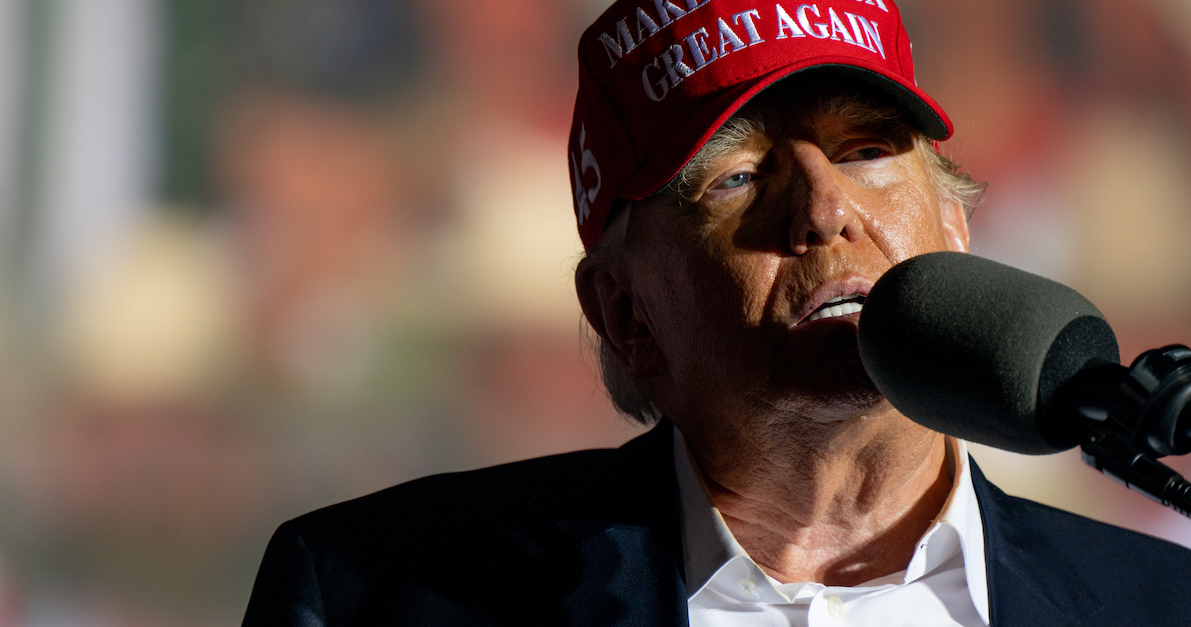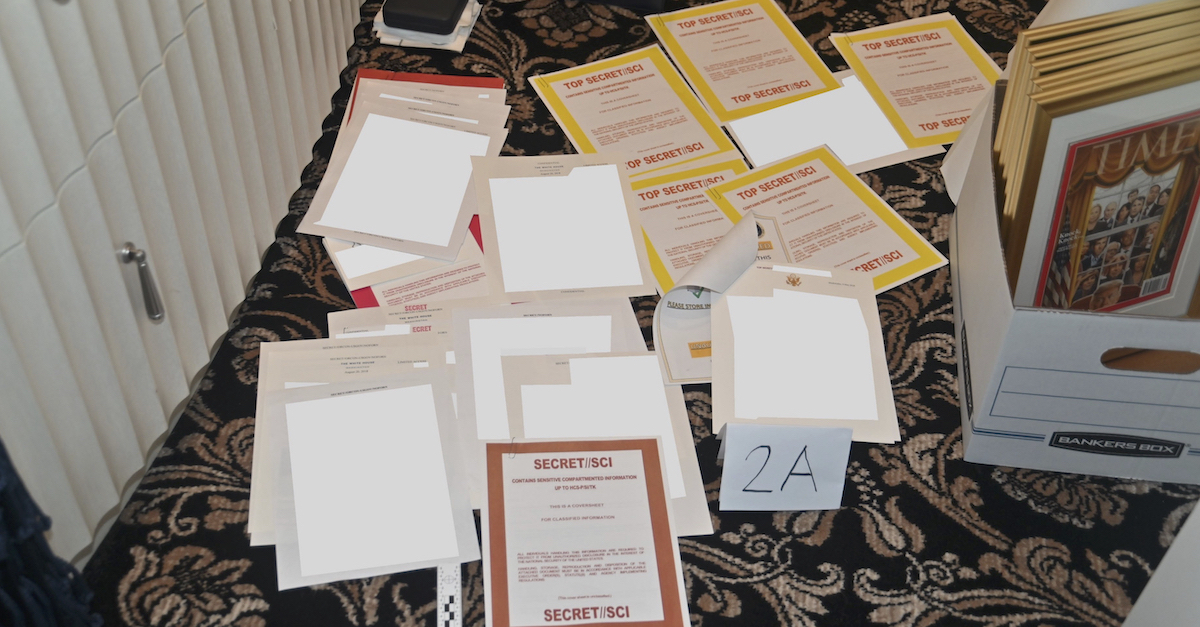
Former U.S. President Donald Trump speaks at a rally on October 22, 2022 in Robstown, Texas. (Photo by Brandon Bell/Getty Images.)
Former President Donald Trump and the U.S. Department of Justice have “resolved” several key disputes surrounding a cache of documents seized on Aug. 8 from Mar-a-Lago, according to a DOJ court filing on Monday.
Those documents include letters to and/or from the National Archives and Records Administration, or NARA, and a log containing Trump’s phone calls — including several “handwritten notes” and a “message from Rudy.”
Federal prosecutors told Senior U.S. District Judge Raymond Dearie, who has been tapped as a special master to oversee portions of the proceeding, that the mutually “resolved” matters include “all outstanding attorney-client privilege disputes” involving several subsets of documents that have been segregated out of the overall tranche of material recovered.
The entire cache of documents seized on Aug. 8 has been spit into several batches for review by an internal DOJ filter team referred to as “Filter A,” “Filter B,” and “Filter C” Materials.
“Plaintiff withdraws his initial claims of attorney-client privilege and attorney work product doctrine with respect to the following Filter A and C Materials,” the DOJ letter indicates.
It notes that Trump “previously did not assert attorney-client privilege or attorney work product doctrine” with respect to certain documents.
By cross-referencing the page numbers in Monday’s letter with a previous court filing, the documents that have been uncontested included a draft of a 2019 immigration initiative; papers entitled “Executive Action to Curb Illegal Immigration and Move Towards Merit-Based Entry”; portions of documents pertaining to several clemency and pardon requests, including that of Rod Blagojevich; an email involving John Walker Lindh’s release; an email from Trump’s attorney Charles Harder to the New York Times; a document entitled “Molly’s Questions for POTUS Approval”; and portions of an email from Kurt Hilbert to the White House “regarding signed verifications for Fulton County lawsuit and federal complaint and three verifications.”
The material that the DOJ says Trump has now “withdraw[n]” those two specific types of privilege claims includes the following:
(1) An “[u]nsigned letter from Kasowitz Benson & Torres to Robert Mueller dated 6/23/2017”;
(2) Portions of an internal analysis surrounding a clemency request for Ted Suhl, the leader of what Trump’s White House called a “faith-based behavioral healthcare treatment centers for juveniles in Arkansas.” Suhl was convicted of bribery, but Trump did, indeed, commute his sentence;
(3) Portions of the Blagojevich documents referenced above;
(4) Portions of other “[i]nternal pardon package[s]”;
(5) The “[c]ontents of [a] red folder marked ‘NARA letters & other copies'”;
(6) the “[c]ontents of [a] manila folder marked ‘NARA letters one top sheet + 3 signing sheets'”; and
(7) sheets which detail “The President’s Calls,” including one marked “Message from Rudy,” and “four blank pages with miscellaneous handwritten notes.”
Also included in the “resolved” materials is one page from the “Filter C” materials for which no description can immediately be found on the court docket.

Federal prosecutors say FBI agents seized these materials from Mar-a-Lago. The contents of the documents were redacted with white squares. (Image via an Aug. 31, 2022 federal court filing.)
From here, the documents face further scrutiny.
“The parties agree that these materials can be provided immediately to the government’s Case Team so that issues concerning executive privilege and the Presidential Records Act can be resolved,” the letter says.
The “case team” takes over once the “filter team” has segregated potentially privileged documents and any issues are resolved.
The outstanding issue, then, is whether the documents contain material that can be interpreted under a novel form of executive privilege. Generally, according to myriad DOJ filings, the executive branch can only assert the privilege over other branches of government, namely Congress. However, Trump has disputed that assertion. Rather, his lawyers have asserted that Trump can assert executive privilege over the DOJ and the administration of Joe Biden — which, according to the DOJ, would prevent the executive branch from accessing its own documents.
In Monday’s letter, the DOJ said it would “return the originals” of some of the documents to Trump but would “maintain a control copy.”
“In conclusion, the parties jointly and respectfully submit that all issues concerning attorney-client privilege and work product doctrine with respect to the Filter Materials have been resolved,” the document concludes.
The accord appears not to cover significant portions of the “Filter C” materials or any of the “Filter B” materials, so the dispute among the parties is not over. Nor does it settle another dispute: whether the documents are “personal” or “presidential” in nature under the Presidential Records Act.
It may, however, be characterized as a win for Dearie’s oversight of the matter. Last week, the special master instructed the parties — especially Trump’s lawyers — to pin down precisely what privilege they were asserting over the documents in question — especially the letter to Mueller.
Dearie said he expected the parties to explain “at a minimum” who represented Trump in order that some form of attorney-connected privilege apply. He also said he needed to know the specific “litigation in which” the attorney work product was created and whether or not the presence of a third party might defeat attorney-client privilege.
He further said he needed to know the specific “facts on which the government is relying” to explain why the privilege doesn’t apply.
After some verbal jousting between the DOJ and Trump’s lawyers, Dearie grew weary.
“I have no patience for either of you,” he said in a polite yet firm exchange.
The upshot of those demands for specific facts connected to the documents appears to have been an accord that none of the contemplated attorney-specific privileges applied at all.
The letter which memorializes the agreement is available here.
Have a tip we should know? [email protected]